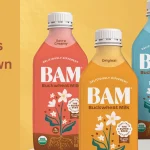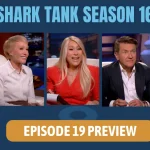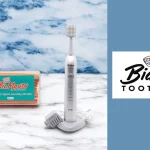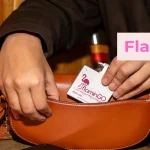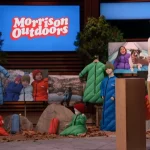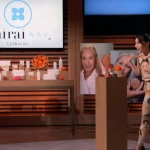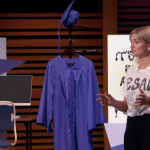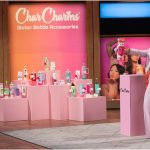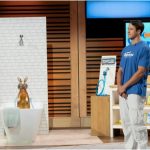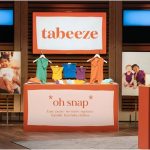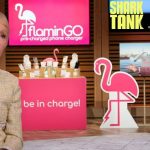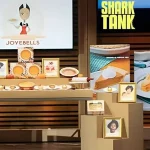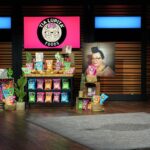Beyond the Tank Episode 104
 Beyond the Tank episode 104 aired Tuesday, April 5, 2016. Three past Shark Tank companies get an in-depth, 20 minute update segment on what their life is like after Shark Tank and viewers get to see them interacting with their investor/sharks. Beyond the Tank episode 104 features a look at one of Lori Grenier’s most successful investments, Drop Stop. Lori, along with entrepreneurs Marc Newburger and Jeffrey Simon, have taken Drop Stop to more than $10 million in sales since she invested in the company in season four. Can Drop Stop take it to the next level? We’ll see Kristina Guerrero, owner of TurboPup, the canine protein bars Daymond invested in during season 6, visit New York to discuss licensing her product. Will she agree? Mr. Wonderful pays a visit to Sharon and Kate from Frill Clothing; both Kevin and Barbara invested in the sorority clothing company in season six. Can he help Frill double their sales?
Beyond the Tank episode 104 aired Tuesday, April 5, 2016. Three past Shark Tank companies get an in-depth, 20 minute update segment on what their life is like after Shark Tank and viewers get to see them interacting with their investor/sharks. Beyond the Tank episode 104 features a look at one of Lori Grenier’s most successful investments, Drop Stop. Lori, along with entrepreneurs Marc Newburger and Jeffrey Simon, have taken Drop Stop to more than $10 million in sales since she invested in the company in season four. Can Drop Stop take it to the next level? We’ll see Kristina Guerrero, owner of TurboPup, the canine protein bars Daymond invested in during season 6, visit New York to discuss licensing her product. Will she agree? Mr. Wonderful pays a visit to Sharon and Kate from Frill Clothing; both Kevin and Barbara invested in the sorority clothing company in season six. Can he help Frill double their sales?
Find out on Beyond the Tank!
Beyond the Tank Episode 104 Featured Sharks
- Investor – Daymond John
- Investor – Lori Grenier
- Investor – Kevin O’Leary
Beyond the Tank Episode 104 Entrepreneurs
- Company – TurboPup
- Company – Drop Stop
- Company – Frill Clothing
Beyond the Tank Episode 104 Recap
TurboPup
Christina Guerrero came to Shark Tank in season 6, to introduce her company, TurboPup. She hoped to sell her power bars for dogs – easily portable, protein-based bars made for dogs on the go. Daymond John made her an offer of $100,000 for 40%. She countered for 35%, and Daymond accepted.
“I invested in Christina and TurboPup,” says Daymond, “Because it’s really about the entrepreneur, and somebody with her energy, she’s not going to stop.”
Christina was determined to impress her Shark. “Daymond didn’t just take a chance on TurboPup,” she recalls. “Daymond really invested in me; and so it’s been so important to prove that I’m worth the investment.”
On the first airing of Shark Tank, TurboPup made $30,000 in sales. Christina’s been handling all aspects of TurboPup herself, sales, distribution, fulfillment, and all. Daymond has invited Christina to NY to discuss the future of the company and what direction the company will go in next.
“Christina’s fairly new to the Shark family, and we have to give a little more TLC at this point. So I want to discuss the future of TurboPup and how we’ll work together,” says Daymond of the meeting.
Sales are at $40,000. Daymond’s not impressed with the numbers. Christina mentions that Publix and HBE have inquired about TurboPup. Daymond tells Christina that it may be time to license TurboPup, enabling a company to take over copacking, marketing, branding, etc.
Christina is afraid to lose control of her company. “For me, what’s important is, not to sit back and just get checks,” she says. “I want to be a great entrepreneur, and I want to collaborate with the team, to make the best product we can.”
Daymond explains to her that she could negotiate a position within the company, so that she could take part in the development of TurboPup.
Christina has already had another inquiry looking for 100,000 bars per month for service dogs. Daymond tells her that the sales contract would mean $1 million in sales. The inquiries make Daymond believe that licensing is more important than ever. His licensing manager explains that they have interest from a company called Fetch, that is well established in the industry. Christina and Daymond go to a meeting to discuss a possible licensing deal with Fetch.
Fetch handles development, manufacturing, and distribution, as well as marketing. Daymond inquires about Christina’s potential involvement. The Fetch executives assure Christina that she can be a part of the development team and remain involved with her company.
Daymond is impressed with the way Christina handles the meeting with the Fetch executives. “Christina’s actually holding her own. She’s taking the ball and running with it. I love this about her. She’s very excited; she’s not going to stop. I’m proud.”
The Fetch executives mention the Global Pet Expo, a world-wide convention that would launch TurboPup into an international market. They will need a lot of work from Christina. They need her formula, price point, sales, and artwork, so that they can prepare for the launch. TurboPup is about to take off, but the success relies heavily upon Christina’s hard work and determination.
“I have to be successful at Global Pet Expo,” says Christina. “I don’t know if this is going to work. I don’t know if this is going to be a spectacular fail. I do know that, if it doesn’t work, I’m not only going to feel awful, but I will also have let Daymond down.”
Christina makes it to the Expo. The Fetch executives are impressed with her preparations and presentation. She had a week to prepare a display and presentation which normally takes Fetch six months. At the Expo, Christina meets a Petco executive. Her confidence and passion sell the Fetch executives, and they sign the licensing deal.
“I can’t even wrap my head around all that’s happened, because it’s so beyond anything I could’ve imagined,” says Christina. “When I started TurboPup, I never would’ve thought I’d go this far.”
Drop Stop
Jeffrey Simon and Mark Newburger came to season 4 of Shark Tank with their company, Drop Stop. Lori Greiner offered them $300,000 in return for 20%.
“I invested in Drop Stop because it’s a fantastic product. I love getting behind something like that,” says Lori.
In the first four years of business, Drop Stop did $1.3 million in total sales. In the year and a half since appearing on Shark Tank, they’ve made over $10 million in sales. Even with the impressive sales numbers, however, neither Jeffery nor Mark has taken a salary from Drop Stop.
Unfortunately, success has created imitators. The pair have spent over $200,000 filing copyright infringements and fighting against copies. Mark and Jeffrey are becoming overwhelmed by running Drop Stop themselves, working 20 hours a day to handle everything themselves. They’re meeting with Lori to discuss the future direction of the company.
Lori tells them they need to focus on getting the word out on Drop Stop. They’ve been using podcasts, Youtubers, and other alternative marketing. Lori tells them they’ve dominated and saturated the American market, and it’s time to move to the European market and beyond.
“We’re at a crossroads,” she tells them, “Because you’re overworked and understaffed. You’re overseeing it all. You have to execute each one of those orders, and you have to execute the directions… There comes a time when you have to hire on more. You have to expand and grow, or you just hit a plateau and you just stay stagnant there.”
The pair is reluctant to give up control of their company, but they recognize the validity of what Lori’s telling them. They both recognize that they’ll have to release some control and not oversee every step of the company’s processes.
Jeffrey and Mark go on the Adam Carolla podcast show in order to promote Drop Stop to an international audience. One week later, they meet with Lori again. They invite her to dinner and introduce her to their support team, people who have invested and carried them through the ups and downs of the company.
“Mark and Jeff are really special,” says Lori. “Not only are they brilliant and motivated, they have a community of people who are behind them. I’m so proud of what they’ve accomplished. I think Drop Stop can go really, really, really far.”
Frill Clothing
Kate Steadman and Sharon Bui appeared on season 6 of Shark Tank. On the night the episode aired, they had a viewing party, but couldn’t reveal to the participants that they’d landed a deal on Shark Tank with Kevin O’Leary.
The pair invited Kevin to attend the viewing party, creating a buzz of excitement at the party. The biggest worry is that the website could crash from the amount of traffic that an appearance will create. The group watches the airing of the episode during the party, and see Barbara Corcoran make an offer for $100,000 in return for 1/3 of Frill Clothing. Kevin offers to join Barbara’s offer. The girls counter for 30%, and the Sharks accept the offer.
Kevin is confident in his investment. “I’ve seen similar models that have lasted forever,” he says. “High school trophies. College rings. Because there are always new generations needing those items, companies form and stay around to supply them. Frill could be one of those, if it can just get big enough.”
In spite of an influx of 14,000 viewers, the site is still running strong. One sorority has e-mailed looking for an order of 100 dresses. The party is a success, but there’s a lot of work to be done.
Kevin is concerned that their current process isn’t scalable, that if the orders begin pouring in, that they won’t be able to sustain production to keep up with demand. The day after the party, the girls meet with Kevin to talk about the future. The appearance boosted web views by 800%, which is great, but there’s more to be done.
In the past year, they girls had sold $250,000. Their goal in the upcoming year is $500,000. Kevin wants to talk about how they’re going to make the growth happen. Sharon explains that she needs a sales team that will reach out to sororities and expand sales.
Kevin believes that they should step away from bridal sales, because the competition is so strong in that market. The girls agree that the bridal division has actually drained profits. They decide together to phase out the bridal division.
In order to grow the sorority division, the girls discuss their current sales model – sending out samples of as many as 11 dresses at a time to each sorority, that they are allowed to keep for up to a week. Kevin believes that the samples program is slowing down sales and costing too much. Sharon offers a solution – a brand “ambassador” program, in which they’d send a sales representative to each sorority, and host fittings for the girls to try the dresses.
Kevin agrees that the ambassador program would be effective, and that Sharon needs an assistant. He wants to see them grow, but he recognizing the hard work that’s needed.
“This is their defining moment,” says Kevin. “This could be a great success story or a dismal failure. It’s their decision, which way it goes.”
“The future is bright with Frill,” says Kate. “We’ve got Kevin and Barbara on board, so things can only keep getting better from here.”
Sharon agrees. “We’ve always done what it takes to get where we want to go.”
Frill looks to be a successful investment for Kevin and Barbara, with two young entrepreneurs who are willing to take Shark direction and run with their opportunities.


